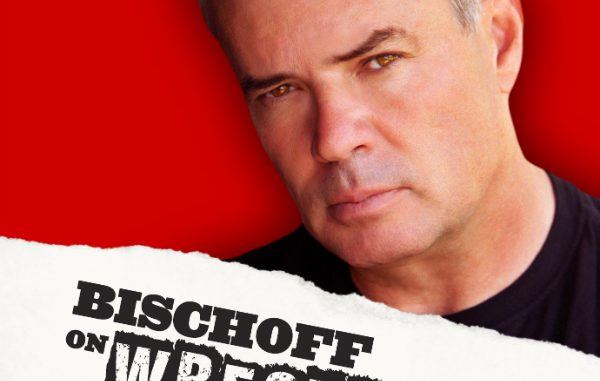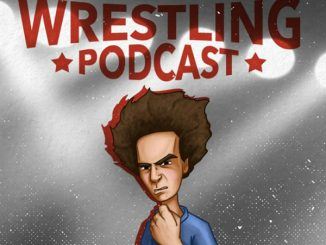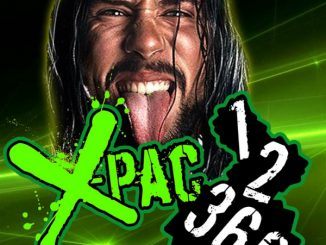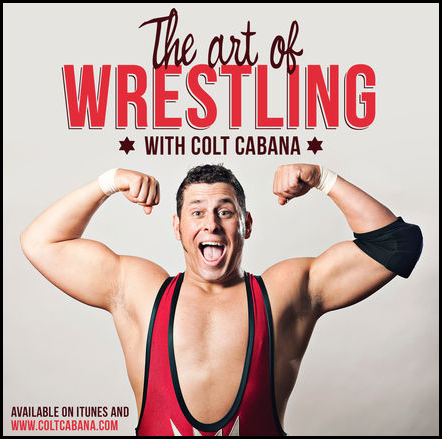
Bischoff on Wrestling with Co-Host Nick Hausman
Episode 54: Bischoff on Brock Lesnar/Jon Jones, C.M. Punk, WWE Financials, etc.
Release Date: August 4, 2017
Recap by: Ryan Thompson
DIRECT LINK TO LISTEN/DOWNLOAD
Top Newsworthy Items:
– Eric doesn’t think the McMahons would ever sell WWE
– Eric hates the brand split
– Eric loves the idea of the reigning Universal Champion fighting in the octagon
– Eric hates the idea of another “superstar shakeup” and the brand split as a whole
– Television is still incredibly important to WWE’s brand and growth
– Did I mention Eric hates the brand split?
Show Highlights:
Show Introduction:
Show opens with a discussion about the rodeo, as Eric is from Cody, Wyoming, “the rodeo capital of the world.” Eric talks about how he’s been to professional bull riding shows before, and that he and Jason Hervey (his business partner) have produced a show for CMT about the PBR (Professional Bull Riders), but it never made the air.
Nick talks about how he watched a program called Dope Man, which Nick describes as “one part Intervention, one part Dog the Bounty Hunter.” The show follows Tim Ryan, a former addict, helping people get over their drug abuse. Tim himself lost a son to heroin addiction. Sounds like quite the heavy show.
Nick announces that Eric will be on the flagship MLW radio show this week. He also announces that Eric and Nick will now be offering premium content on the IRW Network. The Bischoff on Wrestling Overrun (the shorter, Monday show) will now be behind a $3.99/month pay wall. They plan on adding more premium content as more time passes. Nick, somehow, leads into a story regarding how when Walt Disney opened Disney World, he had no sidewalks. This was because he wanted to see how the customers would naturally walk to each ride and plan the sidewalks accordingly. According to Nick, this is similar to how the new premium content will be determined. Fascinating.
News Items:
Nick gives a shout out to Corey Graves for mentioning, on Bring It to the Table, that the Bischoff show is one of the two podcasts that he listens to (along with Something to Wrestle With Bruce Prichard).
Brock Lesnar/UFC: The major news of the week was Jon Jones defeating Daniel Cormier and calling out Brock Lesnar after the fight. There are rumors that there may be more of a relationship between WME/IMG and WWE than there appears to be. One such rumor is that Vince McMahon would consider selling WWE to WME/IMG. Eric can’t imagine the McMahons selling the company. “It’s a McMahon legacy,” according to Eric. Nick argues that Vince loves “crowning achievements” and that being able to get a multi-billion dollar sale out of his life’s worth would be right up his alley. Because the company is publicly traded, Eric argues, you have a responsibility to your shareholders to not entertain anything like that.
Justin Barrasso from Sports Illustrated reported that Paul Heyman is currently advocating for Samoa Joe to be the next WWE Universal Champion if Brock is leaving. However, there have been reports that WWE has been sending out false ideas to see how wrestling journalists will react.
Eric claims he has never done this, mostly because he was so anti-wrestling press. He doesn’t see any reason WWE would have to do this because of their massive database of information that they have. Nick asks Eric how he would feel about the WWE Universal Champion walking into the octagon as champion. If he were in WWE, he would love the idea. He’s wearing their belt and their brand. On the other hand, if he were in UFC, he would hate that idea. He doesn’t think UFC wants to associate too closely with professional wrestling.
WWE: Both Raw and Smackdown this week had major pay-per-view caliber main event matches with clean finishes (Samoa Joe vs. Roman Reigns vs. Braun Strowman and John Cena vs. Shinsuke Nakamura, respectively), and both led to ratings increases. Eric thinks that doing big matches on television, every once in a while (Eric knows the consequences if you overdo it), is a great way to stimulate interest in the product. Nick asks if they did this due to the rumors of Raw and Smackdown moving over to the network because of failing ratings. Eric doubts it, saying he’s never known WWE to be a reactive company. Eric thinks Nakamura going over was the right decision: it’s someone new, and Cena is going away to film a movie anyway.
Nick references the sick bump that Cena took on the Nakamura Regal-Plex at the end of the match and if Hollywood movie producers would react negatively to that. Eric says that for the most part, the producers don’t want you doing anything more dangerous than “taking a shower in the morning.”
There are reports that WWE is considering doing another “superstar shakeup” after SummerSlam. This time, however, it would include both NXT and 205 Live. Eric hates this idea. He thinks it makes it harder to distinguish the brands when people are constantly moving back and forth. Enzo Amore’s name comes up specifically. Without going into too many details, Nick references the rumors of the backstage heat on him. He thinks it would be a decent idea to get him on either NXT or 205 Live to give the character a fresh start. Eric agrees and would embrace it if he were a talent. Nick wonders if there were any WCW talents that could have done more if they had taken advantage of the freedom that the company give them. Eric responds “yes, of course, but don’t ask me who.”
WWE recently applied for the trademark to Taboo Tuesday, implying that it could be coming back. Nick wonders why Taboo Tuesday didn’t work in the long run. Eric doesn’t really have a reason why it didn’t work.
Nick thinks this would work even better today, since many of the fans are very interactive online and love to vote in polls. He references that WCW used to let fans vote on matches on the old WCW hotline. Eric admits that, essentially, it was strictly used to generate money through the hotline. Eric felt it was definitely a success in that regard. He claims that most of the wrestlers backstage enjoyed this, as it was considered a new challenge for them.
When Nick asks whether they ever looked at the votes and were shocked by somebody getting so few, Eric claimed they were very careful in the creative process in order to get the public to vote for whom they wanted, much like what WWE did with Taboo Tuesday and Cyber Sunday. All that being said, the votes on the hotline were a shoot, and they never changed the votes, even if it didn’t go the way they wanted/expected.
ROH/C.M. Punk:
ROH CEO Joe Koff recently told C.M Punk. that he could come back anytime he wants, no questions asked. Eric says he can’t imagine that Punk thinks he has a future in MMA and that as he is still a young enough man, he should consider going back into wrestling.
WWE Financials:
WWE had a revenue increase of 8% to a record $214.6 million, yet are still trying to cut costs. One way they are cutting costs is by cutting pyro. Eric thinks pyro is important to make a show seem bigger, but that it doesn’t have to be used on every show or every match. Use it sparingly.
According to Dave Meltzer, they’re only at about $6 million in profits in 2017, more than halfway through the year. This also leads to WWE slowing down on the UK expansion that was expected to begin this year.
Nick thinks the company is going to be a little more patient in their world expansion because of how much money that costs. Eric agrees, and adds that much of the expansion was probably to help grow the WWE Network in foreign markets.
Eric claims the reason that wrestling continues to work, year after year, is because its relatively inexpensive to produce and because “you have a direct relationship with the television audience,” due to being a touring brand. Those people that watch on television will probably come see you live when you come through their town, even if only once per year.
Eric goes into a long-winded story about the history of televised wrestling but, essentially, from the beginning of televised wrestling, on the DuMont Network, to syndication, to cable, to digital, professional wrestling has always been one of, if not the most, successful programs on television and expanding to foreign markets certainly doesn’t hurt the cause of generating more interest and more revenue. Nick doesn’t feel that they need to expand to foreign markets right now and should focus on their four shows right now.
WWE had an 18% increase in digital video views (9.1 billion views) in the second quarter of 2017. Nick wonders if the move over to digital is going faster than anyone realizes. Eric says, “That’s a safe statement.” Eric wonders, however, how you make money off of 9.1 billion digital video views. If you can’t make money on it, what does it mean? Eric asks what would happen if WWE lost their television? He believes that the 9.1 billion views would almost instantly crater, even though the vast majority of those views don’t come from television. Television is used to increase the audience, after all.
Dave Meltzer reported that having two pay-per-views a month might be doing more harm than good, in the long run. Eric agrees, saying that it dilutes the product and takes away the special feeling of the individual pay-per-views.
Eric says that in WCW, the audience was conditioned to always expect something special on pay-per-view and when you have so many of them, people are less inclined to spend money on them. He hates the brand split, feeling that neither show has anything to differentiate itself from the other show. When nobody cares about the individual shows, nobody cares about the pay-per-views.
Nick wonders if it would be better to have one pay-per-view per month and that each show should contribute roughly four matches. Eric doesn’t think that anything involving a brand split will work until the company makes the shows feel different. Eric thinks the major problem with this is with creative. He thinks the creative team needs to think of every possible way to make Raw different from Smackdown and then do the same thing for Smackdown. He wants to be able to tell one of his friends the differences between the shows, other than the talent.
Score and Review (7/10):
I’m someone that loves mailbag questions, so I was disappointed not to hear any of those this week, though I understand the reason for it. I’m not a huge fan of the way the brand split has gone thus far. I think WWE has had several opportunities to create some new stars and they seem incapable of doing so. So, it was somewhat refreshing to hear Eric’s take on it, though I think there are some discernible differences between the brands. While, admittedly, the cruiserweight division has been nothing short of a complete failure, the division being on Raw is something that makes it unique, at least in theory. Smackdown having two babyface authority figures instead of just one also makes it seem like a more fun show for the fans. But that’s just my two cents.
Timestamps:
00:00: Show Introduction
10:36: Brock Lesnar/UFC
21:05: WWE
35:18: ROH/C.M. Punk
37:26: WWE Financials
1:03:20: Show Wrap-Up
If you missed it, check out last week’s recap of Bischoff on Wrestling.




Be the first to comment